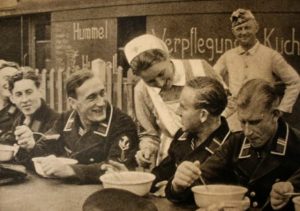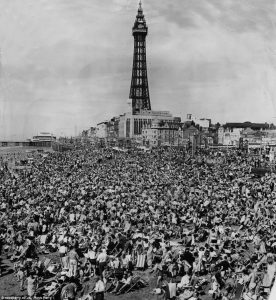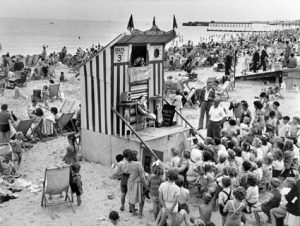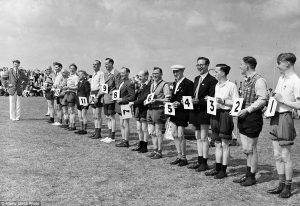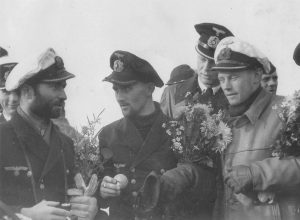
Sir Emo’s father (centre) before ration of Porridge. North Sea 1941. His memoirs, ” The Gruel Sea” make fascinating reading.
Dear reader, a telling piece from that sage of the upper North, Sir Emo of Atney. Not content in joining forces with David Flint in cheering the “naysayers”, in the non binding postal vote, he offers a word or two about where G.B is at, or not at, as the case may be, Read on…
‘I saw Dunkirk last week and thought it delivered a credible and moving insight into what must have been a pretty scary experience for the British people at the time.
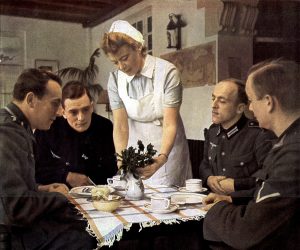
Sir Atney’s Mother demonstrates British stoicism, whilst flower arranging to shell shocked soldiers during the blitz.
During that period my father (a submarine officer in the North Atlantic) and my mother (an Irish nurse in the heavily-bombed East End docklands areal) both saw the horror of conflict close up, yet neither ever said much to me about their fears and hopes at the time. There was a vital job to be done and they quietly and diligently got on with their duty, like so many others: that Blitz stoicism comes through very eloquently in the film.
Here’s how Emile Simpson analyses how the justifiable pride in Britain’s stand in those heroic years has been gradually parlayed into the current delusion and self-destruction, all pumped up by a narrow and inglorious nationalism.
Consider Britain’s one major, undisputed area of economic excellence – financial and business services. Undoubtedly, these did very well out of the UK having a captive continent-sized market (the world’s biggest) right on its doorstep and a key role in its forums. Now, Frankfurt and Paris, as EU insiders, are eagerly lining up to take over that leadership. At the same time, scientific research (the other long-term strength) and education are wilting, thanks to government cutbacks and a growing disinclination by foreigners to underwrite expensive innovation in an uncertain economy that will soon be limited to a small and inward-looking island, instead of continuing as a major launchpad into the 512 million population EU.
To no-one’s surprise, Boris Johnson breezed into Australia the other week, sounding out the possibility of an Imperial Preference System Mk. 1.01 – blithely forgetting how New Zealand, to take only one example, had been vigorously encouraged by London to build its economy around the UK market, only to suddenly find itself four decades ago swinging in the breeze.
Understandably, BoJo got a curt reminder that Australia’s economic focus is now overwhelming and irretrievably embedded in the vast and growing nearby Asian market, thank you very much! And across the Pacific, the Canadians, for their part with more economic muscle than ever and are eager to give the Americans a serious run in their own home market, too (Trumpastrophes permitting) and the rest of the Americas.
In the early 1970s, unsentimental logic and self-interest pointed the UK towards Europe and many in the Commonwealth accepted that. But the logic of this untidy and dangerous shambles is incomprehensible to most people in the world – with the certain exception of the West Wing Tweeter
Wherever you see Hubris, you can be sure that her sister, Nemesis, will not be far behind’!
Sir Atney.
And from a journalist writing in a foreign field somewhere : ‘Ultimately, if the cultural roots of Brexit are reduced to one sentiment, it is that Britain did not win World War II to be run by Germany via Brussels’.
But you see that’s the point. They have lost the war in as much as all those poor bastards who died in France in WW1 did not die so that Australia could sell its raw materials to everyone else cheaply to anyone rather than the locals. That’s what the sage on histroy’s page was trying to tell us. And we at pcbycp wouldn’t have it any other way. It’s what we like about colonialism. Knowing our correct place. That was why Boris came to pay us a visit. Makes us feel important. There’s comfort in that.

